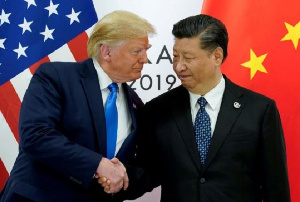China vows fight against Trump’s latest tariffs as stocks sink

China on Friday vowed to fight back against U.S. President Donald Trump’s abrupt decision to slap 10% tariffs on the remaining $300 billion in Chinese imports, a move that ended a month-long trade truce.
China’s new ambassador to the United Nations, Zhang Jun, said Beijing would take “necessary countermeasures” to protect its rights and bluntly described Trump’s move as “an irrational, irresponsible act.”
“China’s position is very clear that if U.S. wishes to talk, then we will talk, if they want to fight, then we will fight,” Zhang told reporters in New York, also signalling that trade tensions could hurt cooperation between the countries on dealing with North Korea.
Retaliatory measures by China could include tariffs, a ban on the export of rare earths that are used in everything from military equipment to consumer electronics, and penalties against U.S. companies in China, according to analysts.
Trump also threatened to further raise tariffs if Chinese President Xi Jinping fails to move more quickly to strike a trade deal.
The 10% duties, which Trump announced in a series of Twitter posts after his top trade negotiators briefed him on a lack of progress in talks in Shanghai this week, would extend tariffs to nearly all Chinese goods that the United States imports.
CONSUMER IMPACT
White House economic adviser Larry Kudlow told reporters on Friday that the impact on consumers from the latest duties would be minimal, despite the fact that the $300 billion target list is nearly all consumer goods, from cellphones and laptop computers to toys and footwear.
“The president’s not satisfied with the progress on the trade deal,” Kudlow told Fox Business Network.
Apple Inc fell more than 2% after a similar fall on Thursday on concerns about tariffs on its core products. Bank of America Merrill Lynch analysts said on Friday that the tariffs could reduce the tech giant’s earnings by 50 to 75 cents a share, with the bulk of that from iPhone duties.
So far, Beijing has refrained from slapping tariffs on U.S. crude oil and big aircraft, after cumulatively imposing additional retaliatory tariffs of up to 25% on about $110 billion of U.S. goods since the trade war broke out last year.
China is also drafting a list of “unreliable entities” – foreign firms that have harmed Chinese interests. U.S. delivery giant FedEx is under investigation by China.
“China will deliver each retaliation methodically, and deliberately, one by one,” ING economist Iris Pang wrote in a note.
“We believe China’s strategy in this trade war escalation will be to slow down the pace of negotiation and tit-for-tat retaliation. This could lengthen the process of retaliation until the upcoming U.S. presidential election” in November 2020, Pang said.
The tariffs may also force the U.S. Federal Reserve to again cut interest rates to protect the U.S. economy from trade-policy risks, experts said.
The Fed got another possible signal for a second rate cut next month from U.S. July jobs data on Friday, which showed a slowdown in hiring and fewer hours for manufacturing workers.
But new data also showed the U.S. goods trade deficit dipped 0.3 percent in June to $55.2 billion in a sign that Trump’s tariff policies were restricting trade flows. The goods trade deficit with China shrank 0.8% to $30 billion with Chinese imports falling 0.7% and U.S. exports to China unchanged.
U.S. Trade Representative Robert Lighthizer and Treasury Secretary Steven Mnuchin briefed Trump earlier this week on their first face-to-face meeting with Chinese officials since Trump met Xi at the G20 summit at the end of June and agreed to a ceasefire in the trade war.
Previous negotiations collapsed in May, when U.S. officials accused China of backing away from earlier commitments.
Source: reuters.com





